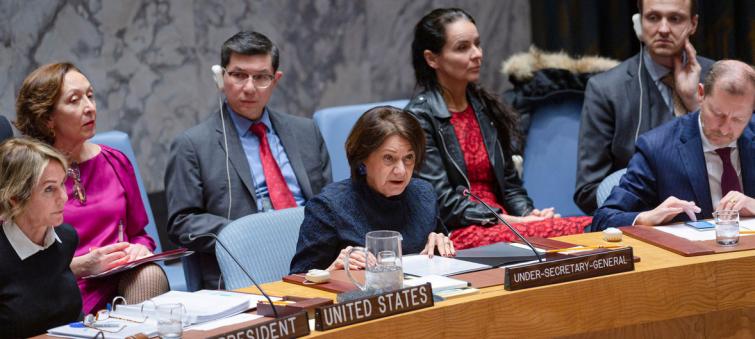
Iran and US both undermining nuclear deal says UN political affairs chief
New York/IBNS: Both Iran and the United States have been putting strain on the groundbreaking 2015 deal to monitor Iran’s nuclear programme, which remains a “cornerstone of international peace and security”, said the UN’s political affairs chief on Thursday.
Rosemary DiCarlo was briefing the Security Council on nuclear non-proliferation, and resolution 2231 that specifically backed the Joint Comprehensive Plan of Action (JCPOA), agreed in July 2015, by China, France, Germany, Russia, The United Kingdom, the United States, the European Union, and Iran (see fact box below for full details).
She said the “full and effective implementation” of the Plan was “key to ensuring the peaceful nature of Iran’s nuclear programme and to secure tangible economic benefit to the Iranian people.”
DiCarlo said the US decision to pull out of the deal was a source of “regret” as well as “the recent steps taken by Iran to reduce its nuclear-related commitments”.
“Certain actions taken by the United States, since its withdrawal from the Plan, are contrary to the goals of the Plan”, she said and the re-imposition of its national sanctions lifted under the Plan, and decision not to extend waivers for the trade in oil with Iran.
But according to the IAEA, she added, Iran since July “has surpassed JCPOA-stipulated limits on its uranium enrichment level, as well as limits on its stockpiles of heavy water and low-enriched uranium.”
Steps have also been taken on centrifuge research and development: “Iran has stated that all these steps are reversible and that it intends to remain in the Plan. It is important that Iran returns to full implementation of the Plan, and refrain from further steps to reduce its commitments”, said the UN Political and Peacebuilding Affairs chief.
Rising regional tensions
Turning to the tensions in the region overall, which have “worryingly escalated” this year, she noted the oil tanker attacks in the Gulf, and the “highly sophisticated and synchronized attack against oil facilities in Saudi Arabia”, all of which stoked fears of a confrontation between the US and Iran.
“These developments have dangerously brought the region closer to a serious confrontation. Such an eventuality would be devastating and must be prevented at all cost”, she said, noting the UN chief’s repeated call for maximum restraint by all sides.
Addressing the attacks and their aftermath on Saudi facilities and the Abha International Airport in August, she told ambassadors that the attack on the large State-owned Aramco facility at Abquaiq and Khurais on 14 September which caused major damage to Saudi oil output, had been claimed by the Houthis in Yemen.
However, the Houthi account had not been borne out she said, as “the number of impact points observed by the Secretariat shows that the attacks involved a larger number, and different types, of weapons systems – which is consistent with the information provided by the Saudis.”
UN cannot independently corroborate origin of oil facility attacks
The US had also supplied additional information that pointed away from Houthi involvement Ms. DiCarlo said, but “at this time, we are unable to independently corroborate that the cruise missiles, or the recovered components we inspected, are of Iranian origin. I would like to stress, however, that this is our preliminary finding.”
Likewise, she said the Secretariat could not independently corroborate that any of the drone debris it examined, were of Iranian origin. “The Secretary-General intends to report back on our further findings.”
Summing up the importance of the JCPOA, Ms DiCarlo said that António Guterres considers the full implementation of resolution 2231, by all Member States “as an integral component of our collective conflict prevention efforts.”
Given the year of tension in the Gulf, “this has assumed greater importance” she noted, adding that it was the Secretary-General’s wish for all countries “to avoid confrontational actions and explore avenues for dialogue and cooperation in the interest of international peace and security.”
Photo caption and credit:
UN Photo/Rick Bajornas
Rosemary DiCarlo, Under-Secretary-General for Political Affairs, briefs the members of the UN Security Council.
Support Our Journalism
We cannot do without you.. your contribution supports unbiased journalism
IBNS is not driven by any ism- not wokeism, not racism, not skewed secularism, not hyper right-wing or left liberal ideals, nor by any hardline religious beliefs or hyper nationalism. We want to serve you good old objective news, as they are. We do not judge or preach. We let people decide for themselves. We only try to present factual and well-sourced news.







